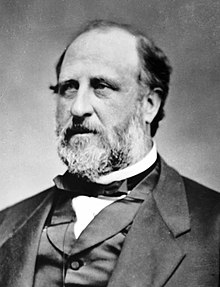Boss Tweed
| William M. Tweed | |
|---|---|

(1870)
|
|
| Member of the New York Senate from the 4th district |
|
|
In office January 1, 1868 – December 31, 1873 |
|
| Preceded by | George Briggs |
| Succeeded by | John Fox |
| Grand Sachem of Tammany Hall | |
|
In office 1858–1871 |
|
| Preceded by | Fernando Wood |
| Succeeded by | John Kelly & John Morrissey |
| Member of the U.S. House of Representatives from New York's 5th district |
|
|
In office March 4, 1853 – March 3, 1855 |
|
| Preceded by | George Briggs |
| Succeeded by | Thomas R. Whitney |
| Personal details | |
| Born |
William Magear Tweed April 3, 1823 New York City, New York, U.S. |
| Died | April 12, 1878 (aged 55) New York City, New York, US |
| Political party | Democratic |
| Spouse(s) | Jane Skaden (m. 1844) |
| Profession | Bookkeeper, businessman, political boss |
William Magear Tweed (April 3, 1823 – April 12, 1878)—often erroneously referred to as "William Marcy Tweed" (see below), and widely known as "Boss" Tweed—was an American politician most notable for being the "boss" of Tammany Hall, the Democratic Party political machine that played a major role in the politics of 19th century New York City and State. At the height of his influence, Tweed was the third-largest landowner in New York City and a director of the Erie Railroad, the Tenth National Bank, and the New-York Printing Company, as well as proprietor of the Metropolitan Hotel.
Tweed was elected to the United States House of Representatives in 1852 and the New York County board of supervisors in 1858, the year he became the head of the Tammany Hall political machine. He was also elected to the New York State Senate in 1867, but Tweed's greatest influence came from being an appointed member of a number of boards and commissions, his control over political patronage in New York City through Tammany, and his ability to ensure the loyalty of voters through jobs he could create and dispense on city-related projects.
According to Tweed biographer Kenneth D. Ackerman:
It's hard not to admire the skill behind Tweed's system ... The Tweed ring at its height was an engineering marvel, strong and solid, strategically deployed to control key power points: the courts, the legislature, the treasury and the ballot box. Its frauds had a grandeur of scale and an elegance of structure: money-laundering, profit sharing and organization.
...
Wikipedia
